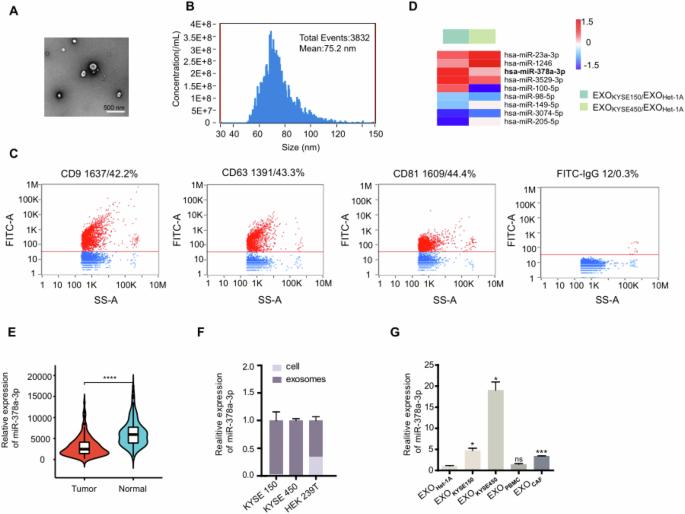TOM1L1 mediated the sort of tumor suppressive miR-378a-3p into exosomes and the excretion out of cells to promote ESCC progression
IF 5
3区 医学
Q1 BIOTECHNOLOGY & APPLIED MICROBIOLOGY
引用次数: 0
Abstract
Exosomes mediate cell-to-cell communication by releasing miRNAs, mRNA, etc. However, there is little research about the effects on the donor cells after miRNAs are excreted out of cells through exosomes. Here, we found that miR-378a-3p was specifically enriched in exosomes and inhibited cell proliferation, migration, invasion, and colony formation in ESCC. In addition, miR-378a-3p was sorted into exosomes through TOM1L1 and extracted mainly out of ESCC cells. Overexpression of TOM1L1 led to tumor suppressor miR-378a-3p accumulation in exosomes rather than in donor cells, promoting ESCC progression. Moreover, miR-378a-3p targets DYRK1A that directly binds to NPM1 and the phosphorylation state of NPM1 at Ser125 to suppress tumor growth. Taken together, our findings demonstrate that TOM1L1-mediated the tumor suppressor miR-378a-3p into exosomes and excreted out of cells to promote tumor progression.

TOM1L1介导肿瘤抑制miR-378a-3p进入外泌体并分泌出细胞,从而促进ESCC的进展。
外泌体通过释放mirna、mRNA等介导细胞间通讯。然而,关于mirna通过外泌体排出细胞后对供体细胞的影响的研究很少。在这里,我们发现miR-378a-3p在外泌体中特异性富集,并抑制ESCC细胞的增殖、迁移、侵袭和集落形成。此外,通过TOM1L1将miR-378a-3p分选到外泌体中,主要从ESCC细胞中提取。TOM1L1的过表达导致肿瘤抑制因子miR-378a-3p在外泌体而非供体细胞中积累,促进ESCC进展。此外,miR-378a-3p靶向直接结合NPM1的DYRK1A和NPM1在Ser125处的磷酸化状态,从而抑制肿瘤生长。综上所述,我们的研究结果表明,tom1l1介导肿瘤抑制因子miR-378a-3p进入外泌体并分泌出细胞以促进肿瘤进展。
本文章由计算机程序翻译,如有差异,请以英文原文为准。
求助全文
约1分钟内获得全文
求助全文
来源期刊

Cancer gene therapy
医学-生物工程与应用微生物
CiteScore
10.20
自引率
0.00%
发文量
150
审稿时长
4-8 weeks
期刊介绍:
Cancer Gene Therapy is the essential gene and cellular therapy resource for cancer researchers and clinicians, keeping readers up to date with the latest developments in gene and cellular therapies for cancer. The journal publishes original laboratory and clinical research papers, case reports and review articles. Publication topics include RNAi approaches, drug resistance, hematopoietic progenitor cell gene transfer, cancer stem cells, cellular therapies, homologous recombination, ribozyme technology, antisense technology, tumor immunotherapy and tumor suppressors, translational research, cancer therapy, gene delivery systems (viral and non-viral), anti-gene therapy (antisense, siRNA & ribozymes), apoptosis; mechanisms and therapies, vaccine development, immunology and immunotherapy, DNA synthesis and repair.
Cancer Gene Therapy publishes the results of laboratory investigations, preclinical studies, and clinical trials in the field of gene transfer/gene therapy and cellular therapies as applied to cancer research. Types of articles published include original research articles; case reports; brief communications; review articles in the main fields of drug resistance/sensitivity, gene therapy, cellular therapy, tumor suppressor and anti-oncogene therapy, cytokine/tumor immunotherapy, etc.; industry perspectives; and letters to the editor.
 求助内容:
求助内容: 应助结果提醒方式:
应助结果提醒方式:


